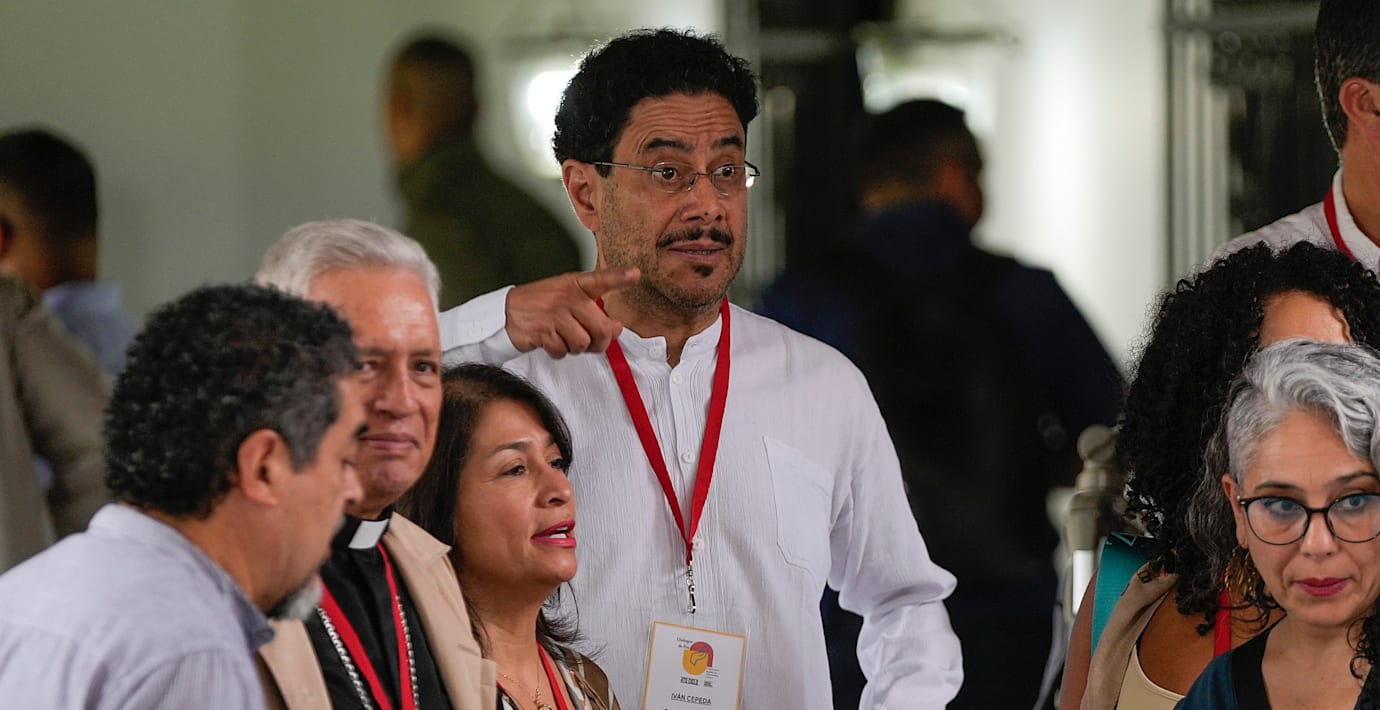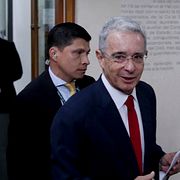
”Detta visar att ingen, ingen står över rättvisan”
Åtalet mot Colombias expresident Alvaro Uribe hyllas av vänstersenatorn Ivan Cepeda, enligt colombianska medier.
För tolv år sedan anklagades han av Uribe för att ha mutat före detta paramilitärer för att vittna mot expresidenten. Det väckte i stället åklagarnas misstankar om att Uribe mutat dem för att vittna falskt, vilket dagens åtal gäller.
– Detta visar att ingen, ingen står över rättvisan i Colombia, oavsett hur mäktig man är, säger Cepeda till tidningen El Espectador.
bakgrund
Álvaro Uribe
Wikipedia (en)
Álvaro Uribe Vélez (born 4 July 1952) is a Colombian politician who served as the 31st President of Colombia from 7 August 2002 to 7 August 2010.Uribe started his political career in his home department of Antioquia. He held offices in the Public Enterprises of Medellín and in the Ministry of Labor and was the director of the Special Administrative Unit of Civil Aeronautics (1980–1982). He became the Mayor of Medellín in October 1982. He was a senator between 1986 and 1994 and finally the Governor of Antioquia between 1995 and 1997 before being elected President of Colombia in 2002.
Following his 2002 election, Uribe led an all-out military offensive against leftist guerrilla groups such as the FARC and the ELN with funding and backing from the Clinton and Bush administrations in the form of a $2.8 billion USD direct foreign aid package called "Plan Colombia". He also led a controversial effort to demobilize the right-wing paramilitary group known as the AUC. All of
these groups were part of the Colombian Armed Conflict. His role in the conflict was accompanied by large-scale alleged exactions: thousands of civilians were killed by the Colombian army, as part of the "false positives" scandal, with almost total impunity. Their deaths are being investigated by the United Nations. Millions of people were the victims of forced displacement.In August 2010, Uribe was appointed vice-chairman of the UN panel investigating the Gaza flotilla raid. In 2012 Uribe and a group of political allies founded the right-wing Democratic Center movement to contest the 2014 national elections. He was elected senator in the 2014 parliamentary election and took office in July 2014. Uribe was critical of his successor Juan Manuel Santos's peace talks with the FARC guerrillas.In August 2020, the Supreme Court of Justice of Colombia ordered his arrest as part of an investigation into bribery and witness tampering. He was released from house arrest on 10 October. The case went to the Fiscalía General de la Nación, after which Uribe resigned from his Senate seat. A number of his political opponents have claimed for years that Uribe should be prosecuted, alleging he has ties with paramilitarism.
bakgrund
Iván Cepeda
Wikipedia (en)
Iván Cepeda Castro (born October 24, 1962) is a left-wing Colombian politician, human rights activist, and philosopher. The eldest son of the late left-wing politician Manuel Cepeda Vargas, Cepeda has served as a member of the Senate since 2014 for the Alternative Democratic Pole. He previously served in the Chamber of Representatives from 2010 and 2014.
Cepeda is the official spokesperson for the Movement of Victims of State Crimes (MOVICE), an organization born in 2003 to bring together the families of victims of crimes against humanity and organizations that work for human rights.
bakgrund
Konflikten i Colombia
Wikipedia (en)
The Colombian conflict (Spanish: Conflicto armado interno de Colombia, lit. 'Colombian internal armed conflict') began on May 27, 1964, and is a low-intensity asymmetric war between the government of Colombia, far-right paramilitary groups and crime syndicates, and far-left guerrilla groups, fighting each other to increase their influence in Colombian territory. Some of the most important international contributors to the Colombian conflict include multinational corporations, the United States, Cuba, and the drug trafficking industry.The conflict is historically rooted in the conflict known as La Violencia, which was triggered by the 1948 assassination of liberal political leader Jorge Eliécer Gaitán, and in the aftermath of the anti-communist repression in rural Colombia in the 1960s that led Liberal and Communist militants to re-organize into the Revolutionary Armed Forces of Colombia (FARC).The reasons for fighting vary from group to group. The FARC and other guerrilla movements claim to be fighting for the rights of the poor in Colombia to protect them from government violence and to provide social justice through communism. The Colombian government claims to be fighting for order and stability, and to protect the rights and interests of its citizens. The paramilitary groups claim to be reacting to perceived threats by guerrilla movements.According to a study by Colombia's National Centre for Historical Memory, 220,000 people have died in the conflict between 1958 and 2013, most of them civilians (177,307 civilians and 40,787 fighters), and more than five million civilians were forced from their homes between 1985 and 2012, generating the world's second-largest population of internally displaced persons (IDPs). 16.9% of the population in Colombia has been a direct victim of the war. 2.3 million children have been displaced from their homes, and 45,000 children killed, according to national figures cited by UNICEF. In total, one in three of the 7.6 million registered victims of the conflict are children, and since 1985, 8,000 minors have disappeared. A Special Unit was created to search for persons deemed as missing within the context of and due to the armed conflict. As of April 2022, the Single Registry of Victims reported 9,263,826 victims of the Colombian conflict, with 2,048,563 of them being children.
Approximately 80% of those killed in the conflict have been civilians. In 2022 the Truth Commission of Colombia estimated that paramilitaries were responsible for 45% of civilian deaths, the guerrillas for 27% and state forces for 12%, with the remaining 16% attributable to other groups or mixed responsibility.On June 23, 2016, the Colombian government and the FARC rebels signed a historic ceasefire deal, bringing them closer to ending more than five decades of conflict. Although the deal was rejected in the subsequent October plebiscite, the same month, President of Colombia Juan Manuel Santos was awarded the Nobel Peace Prize for his efforts to bring the country's more than 50-year-long civil war to an end. A revised peace deal was signed the following month and submitted to Congress for approval. The House of Representatives unanimously approved the plan on November 30, a day after the Senate also gave its backing.
Omni är politiskt obundna och oberoende. Vi strävar efter att ge fler perspektiv på nyheterna. Har du frågor eller synpunkter kring vår rapportering? Kontakta redaktionen
